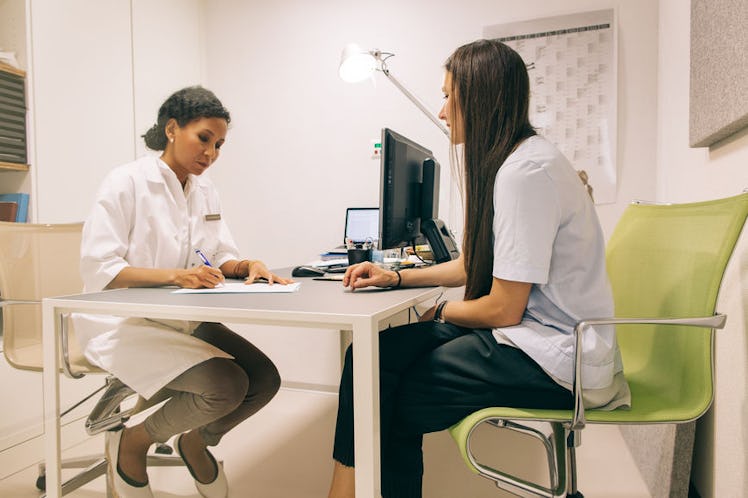
Here’s How To Know If You Have Syphilis, So You Can Treat It ASAP
Sex can and should be a fun, consensual experience for everyone involved. Owning your sexuality and not letting anyone tell you who you can and can't have sex with is empowering! But sexually transmitted diseases, which may come about if proper precautions aren't taken before doing the deed, are not fun. You've probably heard about the more common STDs like chlamydia, gonorrhea, and herpes, but one STD that should not be overlooked is syphilis. So, what is syphilis? I spoke to four doctors about syphilis — what it is, how you know you have it, how you can treat it, and how you can avoid it.
"Syphilis is a sexually transmitted infection that is typically acquired through sexual contact," Dr. Joy Brotherton, Associate Professor of Obstetrics and Gynecology at UCLA, tells Elite Daily. It also happens to be one of the STDs that can be transmitted from a pregnant woman to a baby, if left untreated during pregnancy (known as cogenital syphilis, according to the Centers for Disease Control and Prevention). "For this reason, syphilis screening is a routine part of basic prenatal care for all pregnant women," Dr. Brotherton says.
Syphilis can sometimes get better without treatment, but will continue to come back on much more severe levels. "You can develop secondary syphilis, and it too will get better, even without treatment," Dr. Mary Jane Minkin, OB/GYN at Yale-New Haven Hospital and clinical professor at Yale University School of Medicine, tells Elite Daily. "Then, you can get tertiary syphilis, which can show up in myriad presentations. The most lethal is for people to get an aneurysm of the aorta and folks can rupture their aortas." In other words, the consequences could be really severe if you leave your syphilis untreated for too long. So, here's how to know if you have it, how to treat it, and what to do next.
How can you tell if you have syphilis?
Similar to other STDs like herpes, syphilis first shows itself in genital sores (chancres), often accompanied by inflamed lymph nodes, Dr. H. Hunter Handsfield, Professor Emeritus of Medicine at the University of Washington Center for AIDS and STD, tells Elite Daily. "These sores can heal on their own within a few weeks, even without treatment, so some people miss this stage of the disease," Dr. Kelly Culwell, OBGYN and Chief Medical Officer of Evofem Biosciences, tells Elite Daily. After a few weeks or months, secondary syphilis can develop, exhibiting flu-like symptoms, such as headache, weakness, fever, and muscle aches, Dr. Culwell says.
"Secondary and tertiary syphilis [symptoms also] include body-wide skin rash and a giant variety of symptoms," Dr. Handsfield says. The wide variety of symptoms syphilis may exhibit is the reason why it was once called "the great imitator," he explains. "It can cause problems very similar to those of a large number of other health problems." Unlike most STDs, however, syphilis can result in permanent neurological deficits in babies if left untreated during pregnancy. And it can also become "neurosyphilis, resulting in things like blindness, stroke, and dementia," Dr. Handsfield says.
If you start to notice any of these symptoms, but you're not entirely sure if you have syphilis, the best thing you can do is go in for a blood test to get your diagnosis. If the first test is positive, you may need to take another one to confirm that you do, in fact, have the STD, Dr. Brotherton says. "It is important for sexually active people, particularly those in non-monogamous relationships, to get screened for syphilis and other sexually transmitted infections like HIV, gonorrhea, and chlamydia," she states.
How can you treat the STD?
If your blood test comes back positive for syphilis, one good thing about this STD is that it is treatable. Syphilis can be treated with antibiotics, specifically penicillin. "But if someone is penicillin allergic, we have alternative medications," Dr. Minkin says. While penicillin does cure syphilis, Dr. Handsfield warns that "treatment cannot reverse organ damage already done." So, again, it's important to get tested as soon as you suspect syphilis (or any other STD for that matter). If not, "long-term complications or 'late syphilis' can develop causing heart problems or neurological problems," Dr. Culwell says. All it takes to avoid serious medical complications is penicillin.
How can you avoid getting it in the first place?
Like with most STDs, practicing safe sex is your best bet against getting any sort of infection or disease. "Use condoms during sex and dental dams during oral sex," Dr. Brotherton advises. "In an ideal world, new partners should get tested for syphilis (and other sexually transmitted infections) with a simple blood test prior to becoming sexually active together." But since we don't exactly live in an ideal world, protecting yourself is the best thing you can do when you first become sexually active with someone. However, if the sex turns into a more serious relationship between you and your partner, then it may be good to have a conversation about sexual health, overall.
Remember: Syphilis is a common STD. According to the CDC, there were 101,567 reported new diagnoses of syphilis at all stages. But, it is one that could result in severe medical complications down the road. So, if you suspect that you may have syphilis, or any other STD, get tested as soon as possible. It's better to catch whatever you may have early and cure it than to let it get worse, possibly resulting in long-term consequences.
This article was originally published on